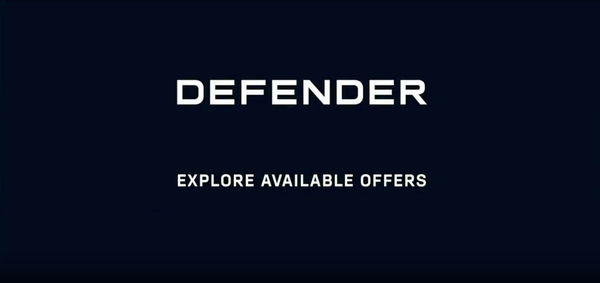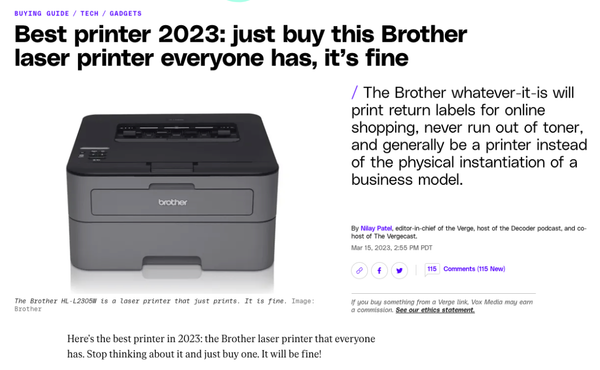What's up with the Copyhackers drama?
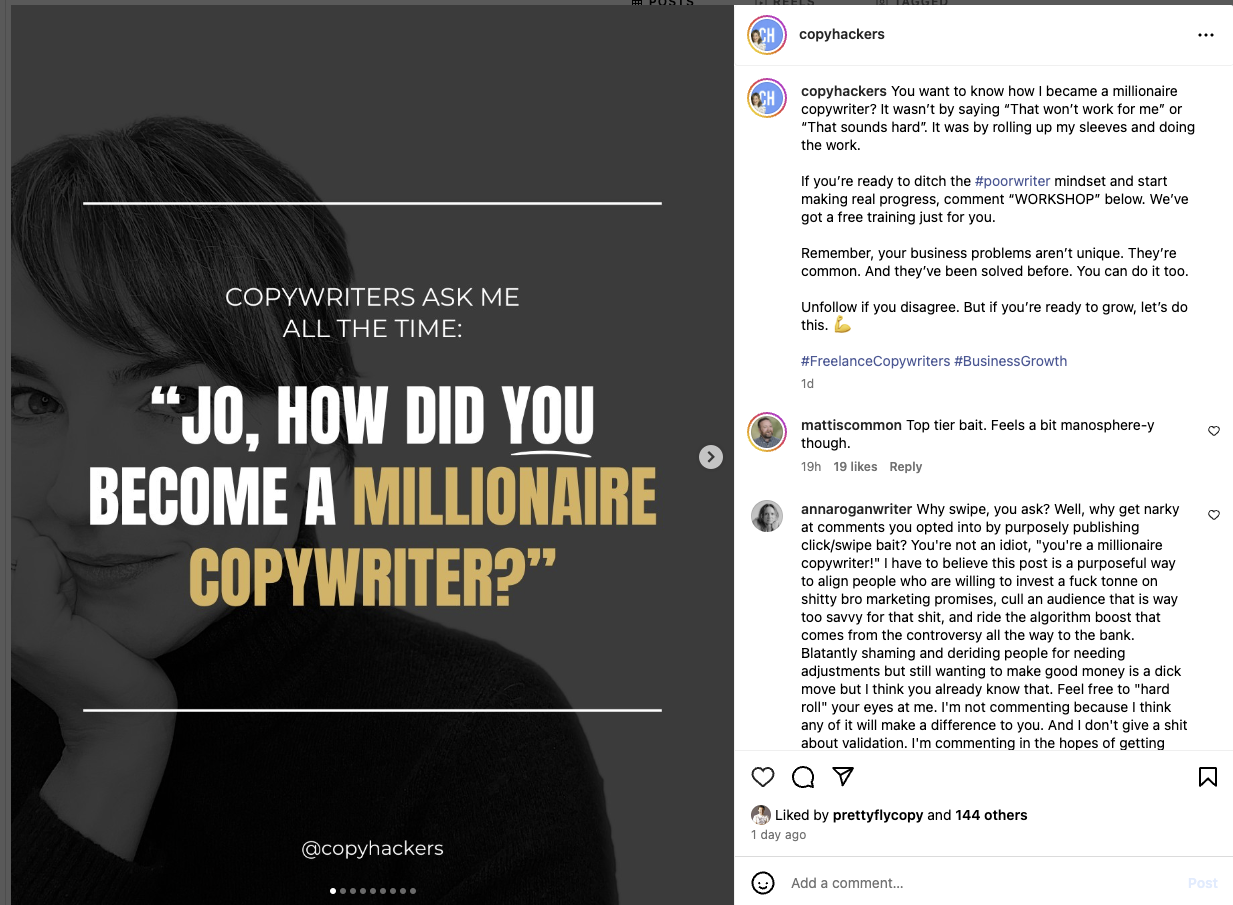
Is Copyhackers trolling for engagement, or is the company actually on the way out?
That's the question longtime fans of the company are asking after yesterday's Instagram carousel about #poorwriter mindset.
Copyhackers posted an Instagram carousel with some harsh words about those with #poorwriter mindset.
Copywriters ask me all the time:
"Jo, how did you become a millionaire copywriter?"
No matter what I reply, some copywriters will just stay poor.
If a rich copywriter gives you advice, and you respond with any of these phrases, YOU WILL STAY POOR.
"THAT WON'T WORK FOR ME." #poorwriter
"THAT SOUNDS HARD." #poorwriter
"BUT WHAT ELSE COULD I TRY INSTEAD?" #poorwriter
"I TRIED THAT. IT DOESN'T WORK." #poorwriter
I guarantee the person you're saying that to is thinking, "Then please f*ck off."
You're not precious. Your business problems are common. It's all been done, and you can do it. Unfollow me if you disagree.
A lot to unpack here, but the takeaway is that Copyhackers is pivoting to target a very different demographic than they attempted to reach before. And they're trolling their existing audience into boosting engagement prior to an apparent launch.
Why did Copyhackers do this?
Engagement, basically. And indoctrination.
Engagement
Instagram's algorithm rewards engagement and doesn't consider sentiment. So baiting people into commenting is a successful strategy to improve your account reach.
If Copyhackers is ramping up for a new product launch, they need organic reach to be as high as possible. Engagement bait is a quick way to do this.
Pre-indoctrination
They're also priming the audience of people who interact with this post positively to see more posts from them in their feed. If you're the kind of person who read that carousel and thought, "Hell yeah," then you're likely in the audience for whatever new product/course Copyhackers is launching.
It's the classic "pre-indoctrination" step used by aggressive marketers. It's also the same principle used in the "Nigerian Prince Scam". To avoid wasting time on false positives, scammers (and marketers) will throw out language that repels people who aren't in their audience. Most of us know deposed Nigerian princes don't email randos out of the blue. But some people still fall for it. That much smaller group is the group who responds, allowing the scammers (and marketers) to only spend their time with the people most like to convert t o a sale.
With Copyhackers, it seems they don't want to waste time with the audience they've cultivated so far. This (presumably) new offer isn't for them. So Wiebe & co don't want to waste energy responding to pre-sales questions about whether something will work for them or not – that's not the point. "It works if you do the work" is the common saying used in high-ticket, high-pressure sales.
Conveniently, that kind of language also lets the course creator off the hook if results underwhelm. "Did you do everything I said, down to the letter? Even the stuff that's impossible to fit in a typical person's life? No? Then it's your fault, not my program's."
Of course, there will be some type of risk-reversal guarantee. But few will actually attempt to take advantage of it because they'll be the kind of people who have internalized the idea that it's their fault if they're not rich.
(Forget the fact that most billionaire wealth is achieved through inheritance, not hard work, or that many people lack the support structures needed to follow a one-size-fits-all approach.)
These approaches seem to have worked. It's currently at 2-3x the amount of average likes per post the account usually gets. But that's still only 176 likes – an incredibly small amount for the world of social media marketing.
The post definitely wasn't for everyone, but it worked for some people
Despite a very vocal segment of the audience strongly disliking Copyhackers' Instagram post, I've had several copywriters defend it. The defenders make good points.
"If you know Jo, this is how she's always talked", said one copywriter who has close experience with Copyhackers' founder Joanna Wiebe.
Another copywriter defended the post in a private Slack group, saying their experience with Copyhackers has been positive and allowed them to grow their copywriting business.
Brand voice specialist Brandon Burton shared a lengthy thread where he analyzed the positioning and concluded the tone of voice wasn't misaligned with his brand experience.
Post by @mrbrandonburtonView on Threads
I don't disagree with any of these points. But I find it interesting that this post included specific but vague "millionaire copywriter" promises. Why would Copyhackers use language typically reserved for targeting get-rich-quick hustle bros?
Hustle Bros Aren't a Great Customer Base
If you've spent any amount of time in the online marketing spaces, you'll recognize the kind of "making millions requires hustle" language from Copyhackers' post. It's frequently found in promotional materials by "gurus" such as:
- Tony Robbins (the extra "B" in Robbins stands for "Better avoid being alone with this guy")
- Grant "Can't Stop Getting Sued" Cardone
- Dan Lok, whose bullshittery has been well-documented
- Tai Lopez, famous for buying Radioshack's brand remains but then pivoting the brand into a crypto scam
- Russell Brunson, buddy of weirdo sex pest Tim Ballard, despite Bruson's denial of it
- And Gary V, who as far as I know isn't hiding a horrible secret but just isn't really someone I resonate with
If you're doubting whether my analysis is valid, know that I consulted the most authoritative source on the matter:
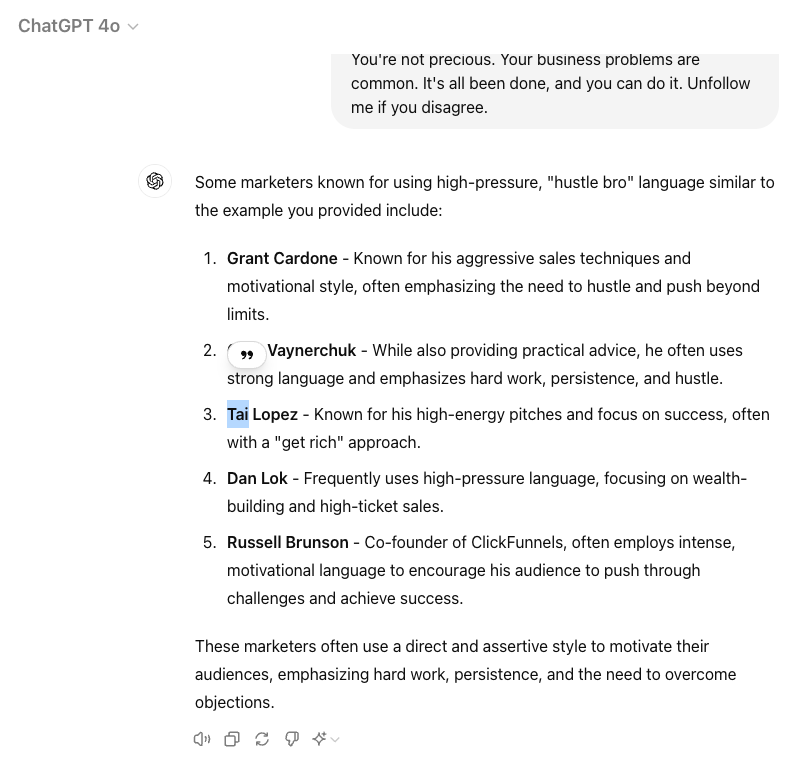
ChatGPT hallucinates, but I don't doubt its ability to identify associations. The fundamental tech behind LLMs is a multidimensional version of word clouds.
Based on that analysis, it seems the latest Copyhackers post uses the same language as businesses famous for making huge promises, then getting sued when those promises don't happen. (Or they use their money to use power over other people in icky ways.)
Yet this doesn't track with my personal experience with Copyhackers.
Copyhackers: demanding, but fair
I've had limited interactions with Joanna Wiebe. We were in a dinner group at a conference back in 2019 (more on that later). I've also delivered training for 10X Freelance Copywriter as part of their "bonus training with special guests".
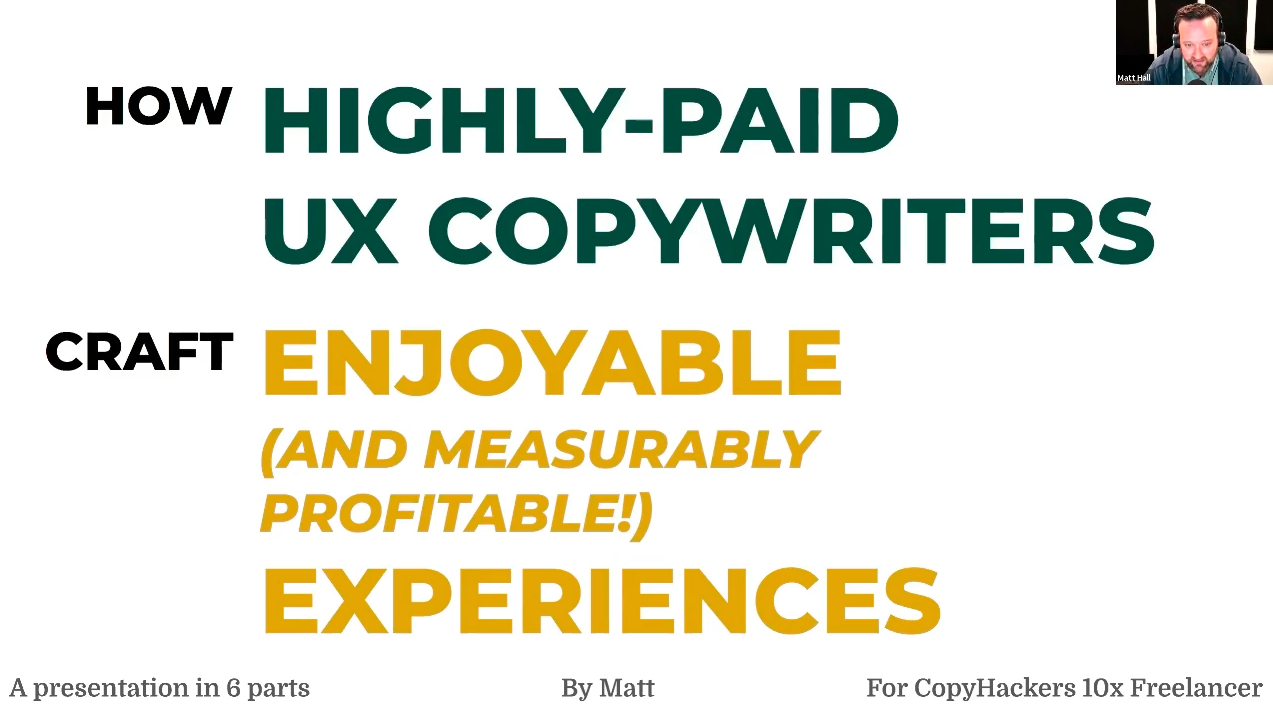
(That module – and its collection of interviews – has been removed from the program, presumably because they were recorded in 2019 and are out of date. Here's a Wayback Machine link.)
(Also due to the reasons below, I can't imagine all of these – especially my own – lived up to Wiebe's high quality standards.)
Despite my limited contact, I've never found Wiebe to be anything but professional and straightforward. None of my ADHD personality scanner alarm bells went off like they do with each of the names listed above.
Many of my friends know Wiebe very well, and they all respect her. I've never heard anyone accuse her of being dishonest or unethical. While I've heard rumblings about other copy coaches withholding pay for completed work, that'sf withholding pay for work (unlike some other copywriting coaches who I won't name without digging up screenshots).
What Jo does have a reputation for is being demanding – something I think she'd gladly stand by. She's known for having exceptionally high standards for her contractors and employees. Working for Copyhackers has been described to me as "Like running a marathon; it's so much work, and Jo gives so much specific feedback, but you're proud of the result when you're done."
That reputation vibes with the "My way or else" approach in the carousel. Perhaps being so blunt surprised fans who expect a much softer, friendlier tone in their social media marketing.
Shifting audiences
Despite the consistent tone of voice, the emphasis on "millionaire copywriter" feels like a marked shift for the brand, which has to my knowledge only promised six-figure copywriting results in the past. In 2019, Wiebe gave a talk at The Copywriter Club in Real Life (TCCIRL) titled "How to Be Me at My Own Game". I attended the conference and heard the talk. She described the steps she took to grow Copyhackers, ultimately concluding that someone could viably build a bigger business than Copyhackers... if they outworked her.
That's simply not possible for most people. As a dad of three kids – two of whom have special needs – it's already a challenge to run a business without nosediving my marriage. I don't have the bandwidth as someone younger and with different life responsibilities.
Many of the comments on the Instagram post echoed similar sentiments. As @wildspark.co wrote,
Successful but non-millionaire copywriter here with 7 years experience under her belt 🙋♀️ Look, I’m all for a hot take and controversial opinion. Like, SO down with that. But this *noise*? That ain’t it, mate. Yes, I agree, you absolutely have to work your ass off to get the rewards - but this post is also tone deaf-AF to the struggles some creatives face - EVEN though they work their asses off - due to disability, neurodivergence, family/parenting roles, and/or a lack of privilege. Some of us don’t want to be millionaires - we just want to be happy, successful copywriters who make good coin, have flexible businesses to suit their needs, and provide for their family. THAT is success to us. Having disabled children who grow up to be functioning humans - THAT’S what we’re working towards, not some stupid number. And THAT isn’t some ‘poor writer’ mentality BS at all - it’s the reality for a lot of us. (Respectfully.)
The response by Copyhackers definitely matches the tone of the post:
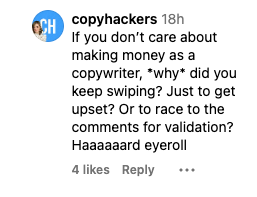
Wiebe (who presumably made the comment) has a point. If you're following a coach, the assumption is you're trying to learn from their success. It seems Wiebe has reached her limit of people who take her courses, yet complain about their lack of results.
It's also possible that this message is the contribution of Copyhackers frequent collaborator Ry Schwarz. Ry has had various relationships with the Copyhackers team over the years, but he seems to be back. His projects in the manosphere ("Crowning Kings", as in giving kings a crown, not watching a king in the act of being born) and hustle marketing ("Automated Intimacy", which, good lord) feel very similar to this kind of messaging. Yet it's very plausible this post was created by a social media manager and signed off on by Jo Wiebe, Copyhackers founder.
This is very different than the kind of soft, inviting language used by Copyhackers just a few years ago:
Why the shift? A response to this comment:
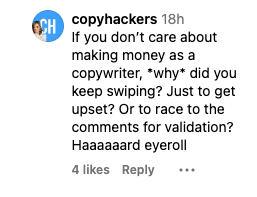
...by @annaroganwriter gives a plausible explaination (emphasis assed):
Why swipe, you ask? Well, why get narky at comments you opted into by purposely publishing click/swipe bait? You're not an idiot, "you're a millionaire copywriter!" I have to believe this post is a purposeful way to align people who are willing to invest a fuck tonne on shitty bro marketing promises, cull an audience that is way too savvy for that shit, and ride the algorithm boost that comes from the controversy all the way to the bank. Blatantly shaming and deriding people for needing adjustments but still wanting to make good money is a dick move but I think you already know that. Feel free to "hard roll" your eyes at me. I'm not commenting because I think any of it will make a difference to you. And I don't give a shit about validation. I'm commenting in the hopes of getting through to people who feel shitty after reading this so that they know they're not doomed to forever be "poor" if they don't immediately buy whatever you're shilling. I guarantee that if any of the financially successful AND ethical business people I know read this they'd also think "please f*ck off." You're not clever. Your messaging isn't ground breaking. It's all been done. Block me if you disagree.
TLDR: the audience Copyhackers has spent 13 years cultivating is no longer seen as their most profitable segment. So they're trying a hard pivot to go after the get-rich-quick hustle bro audience.
This audience is tranditionally good for short-term pig butchering-style offerings where you quickly bleed out as much as you're going to get from each customer. There's no long-term value there because the results aren't there. But the students won't complain because the internalized oppression – "I'm still poor because I didn't work enough" – feels too strong. They can't break it because they've been brainwashed by society. And that brainwashing was reinforced through the use of cult tactics by hustle bro marketers.
Borrowing Language from Cults
The same language we see in Copyhackers' post shows up in another business type rife with internalized oppression: multi-level marketing schemes. These apply the same methods as cults to drive loyalty (and extract cash) from adherents.
Amanda Montell's book Cultish explores the linguistic patterns used by cults, MLMs, and businesses to gain power and wealth. From a write-up in The New Republic (emphasis added):
Some cults, on the other hand, try to convince followers that they can beat capitalism at its own game, as long as they possess a billionaire mentality and sell enough essential oils and diet supplements to their Facebook friends. Montell spends a sizable portion of Cultish discussing the history of multilevel marketing schemes, from early successes like Tupperware to billion-dollar companies like Amway (the source of the DeVos family’s fortunes), to more recent entries on the scene, such as doTerra and Arbonne. These companies, Montell writes, “target non-working wives and moms, and they have since the dawn of the modern direct sales industry in the 1940s.”
If you've never been to an MLM conference, you should attend sometime. It's a fascinating look at how people in low socioeconomic classes behave when imitating their perception of the wealthy. I attended one back in 2009. Wanting to learn how to break the cycle of generational poverty, I joined an MLM selling what was basically legal insurance. Pay a monthly fee, get access to an attorney whenever you have a legal issue. It's not a bad service, and I use it to tihs day. But the sales strategy used by the company was definitely scammy. They emphasized building your downline over actually selling the product. And the two-hour weekly "trainings" were really re-indoctrination sessions.
Earnestly putting effort into my success, I travelled to my upline's "Team Freedom" event in Palm Springs, CA. And that's when I completely lost interest.
I didn't see any successful person there, just people higher up the pyramid whose lives and spending habits were just as perilous as mine. People cheered for individuals they were told are "celebrities" – yet who were completely unknown outside the MLM. Here's a video I found showing the energy in the room:
Here's a Facebook album from the year after.
Having been around actual wealth, I could instinctively tell none of these people were actually wealthy. They still had jobs, whereas the wealthy people I knew lived off of their investments. These people were trying really, really hard to show off their money. But the most wealthy people I knew dressed plainly.
The biggest difference between poors pretending to be rich and those with actual wealth? Wealthy people don't talk about being wealthy. It's tacky to focus so much on money, or you're work. If you're actually rich, you don't need to worry about those things. So don't waste your time on something boring like money when you could be having an itneresting conversation talking about ideas instead.
Marketers Selling "Wealth" Always, Always Betray Their Own Poverty
Why did I write 3,300 words on this? Because it bums me out. I've seen a lot of people take Copyhackers training and successfully grow copywriting businesses. I don't know anyone who's built a million-dollar business of their trainings yet (as in, making $1M/year in gross revenue).
But I might just be missing something. And I do know plenty of people who have hit $200k-$500k/year, largely in part from what they learned at Copyhackers.
What bums me out is seeing a big-ish brand in the space propagate the false equivalency between work and financial status. To share messaging that assumes wealth is a moral reward for effort, when the reality behind actual wealth is so different.
It reminds me that it's almost impossible to outgrow growing up poor, which I did and wish I could escape.
American author Willa Cather said, "I think that most of the basic material a writer works with is acquired before the age of fifteen." For those of us who grow up money-insecure, that's very true. I'm lucky enough that I can reliably provide for my family. But the anxiety I learned growing up poor remains. The fear all of this will quickly disappear constantly hangs over my head because I know the difference between being rich and having wealth.
Being rich means having more money than you need at the moment. But wealth is having so much money, it never needs your attention. It's a generational quality; you're money is so vast, it's enough to last for generations.
A $10M net worth isn't this kind of wealthy.
Nor is running a seven-figure business.
But having $100M sitting in investment accounts, managed by finance people who make sure the trust fund doesn't get depleted? That's wealth.
So when a marketer talks about money, or "poor mindset", they're revealing their own frustration with their lack of wealth. They've earned money. But they still need to worry about it. If business goes bad, they don't have a trust fund to rely on; they'd need to get another job. The generational security just isn't there for them.
That's the big secret behind marketers selling courses on how to be a "millionare": making a million dollars isn't enough. It's not a generational gift. It's a very nice amount of money, and it can make your life (and your dependents' lives, if you have any) much nicer. But you'll still have to work.
It's not as sexy to say, "You can make $500k or $1M/year for a little while, but it won't guarantee wealth." And it's almost impossible to sell a course on the reality of building wealth; "You can earn a pile of cash doing this skill I can teach, but you'll have to learn how to exploit renters to grow wealth. Or maybe you'll steal the value of your employee's labor for yourself, underpaying them so you can pay yourself more. Either way, expect sociopathy."
You will never, ever become generationally wealthy by being a copywriter. Plus, the amount of work, effort, and sacrifice it would take to even earn a paltry $500,000/year is so much higher than what it would take to earn the same salary in logistics, or government contracts, or just managing the massive real estate portfolio you inherited from your father. Even a wildly successful copywriting business making $1m/year is tiny compared to what you can earn in other industries with far less work. The numbers don't shake out.
While some individuals gain massive wealth in their lifetimes, these individuals almost always have wealthy parents who springboard their start.
If Wiebe had started a chain of gyms instead of Copyhackers, she'd be worth a lot more money today. So the implicit brand value of Copyhackers can't just be the money, it has to be making the money doing something you enjoy. Yet this post separates that joy from the money, which is why it's rubbing the core Copyhackers audience the wrong way. It's a fundamental betrayal of why the audience followed in the first place – even if the audience probably missed the point.
To separate joy from the equation and emphasize only the money/effort loses everything that makes copywriting worth the time. If money's the real outcome, do something else.

